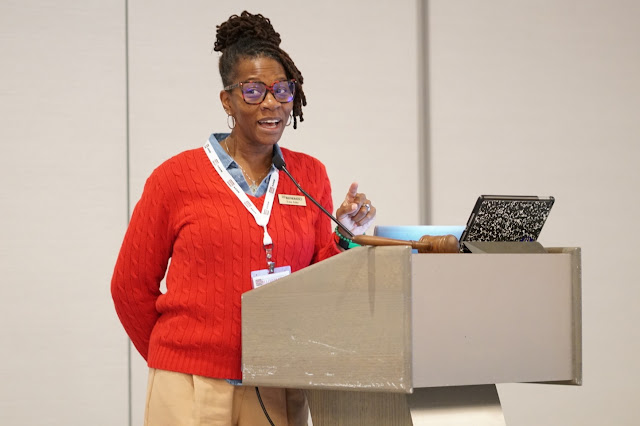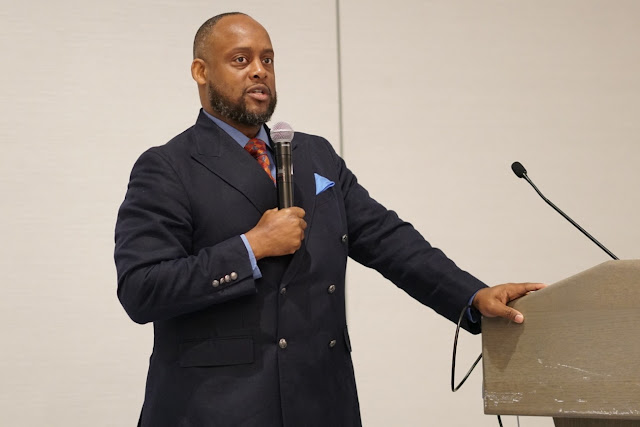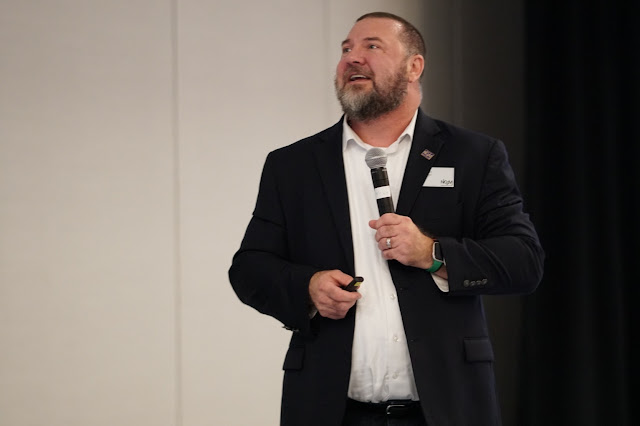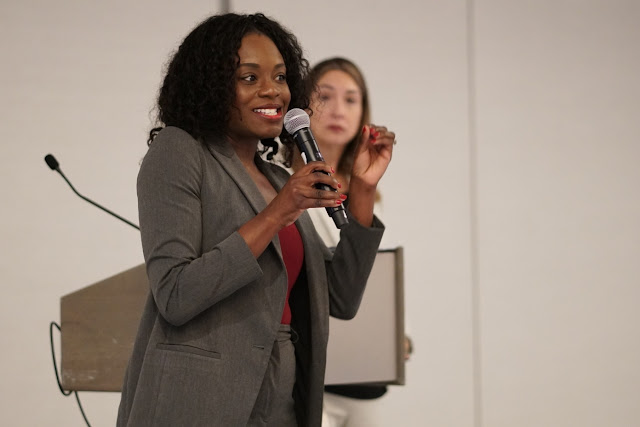 |
| Lisa Ashe |
Today was the first full day of the 2023 ASSM Annual Meeting. After the first portion of our business meeting, we heard a talk about culturally responsive school leadership from Dr. Muhammad Khalifa of Ohio State University. The part that struck me most was his tracing of racist attitudes back to the early explorers of our continent, who either believed that the natives they encountered were (a) sub-human or (b) human but only capable of being "de-savage-ized" through Christianity. And they did so with the blessing of the Pope. It was a wide-ranging presentation, and that was just a little slice of it, but together it helped explain why schools and school leaders reproduce some of the discriminatory practices that are entrenched in our history.
 |
| Muhammad Khalifa |
One of the reasons to attend the ASSM Annual Meeting is that we invite leaders of other organizations to come report their current activities to us. The first such report came from NCSM President Paul Gray. Paul's report began with the highlights from one of NCTM's most recent publications, their book on culturally relevant leadership. Paul also described two new position papers NCSM has published, with one about how we position multilingual learners and the other giving guidance about flexible grouping practices. The second one is a response to their detracking paper from a few years ago, and should help schools navigate when some grouping by ability is okay and supported by research.
 |
| Paul Gray |
The next session was a report from the U.S. Department of Education. USDOE presenters usually have long job titles, and today's speakers were no exception: Glenna Gallo, Assistant Secretary for Special Education and Rehabilitation Services, and her colleague Dr. Kortne Edogun, Senior Advisor for the Office of Elementary and Secondary Education. Much of this talk centered on aspects of USDOE's "Raise the Bar" initiative, as well as summarizing some of the ways the USDOE has been supporting schools, such as with discretionary and formula grants. I will say, as someone who has seen a variety of these reports from the USDOE, these presenters did better to connect to classroom issues than what I've seen in other years.
 |
| Kortne Edogun |
After some lunch, we headed into breakout sessions to discuss either (a) standards or (b) high-quality instruction. I hopped around to take photos, but spent a bit more time with the standards group. It is interesting to hear about the expectations, structures, resources, and constraints that are faced in each state.
 |
| Andy Byerley |
Our last big session of the day was a report from NCTM President Kevin Dykema. Kevin spent considerable time giving us the details about a number of projects, most of which are still in progress and not publicly available.The first was an update on their high school project. That writing group produced a draft, got considerable feedback, then produced a second, significantly revised draft. Now, with more feedback, they're working on the final manuscript which will be available to the public by next year's annual meeting in Chicago. The next part of Kevin's report described position papers that the Council has either published or is preparing to publish. One of them will address how math learning should be recognized and credited in data science courses, and that was is being co-written by NCTM, NCSM, NCSS (social studies), NSTA (science), and the ASA (the American Statistical Association).
 |
| Kevin Dykema |
The third part of Kevin's report described a set of one-page infographics that NCTM is producing to help promote and clearly communicate high-quality math instruction. These should be on the advocacy portion of the NCTM website next week, if they aren't there already. The Council is also making clear how different teacher and student actions are tied to the 5 strands of mathematical proficiency. The final of Kevin's reports announced the joint NCTM + NCTE (English) conference to be held next June 17-19 in New Orleans. This is the first joint conference from the two organizations and will be specifically for teachers of grades K-5. NCTM is also planning a Winter Institute in Nashville for January 22-23. That event is being titled, "Engaging Students Who Struggle: Tools for Effective Instruction."
 |
| 2023 ASSM Annual Meeting Attendees |
The day wrapped up with an update on our emeritus members and a group photo. Attendance is pretty strong this year, and I'm going to have a heck of a time identifying all the faces in the photo.